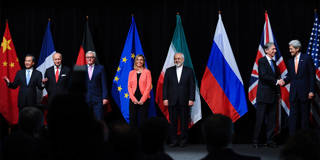No one should confuse the "Joint Comprehensive Plan of Action" with a solution to the problem of Iran’s nuclear ambitions or its contributions to the ongoing turmoil in the Middle East. On the contrary, depending on how it is implemented and enforced, the agreement could make matters worse.
NEW YORK – It is probable that after 60 days of intense debate in Washington, DC, and conceivably Tehran, the “Joint Comprehensive Plan of Action,” signed on July 14 by Iran and the UN Security Council’s five permanent members plus Germany (the P5+1), will enter into force. But no one should confuse this outcome with a solution to the problem of Iran’s nuclear ambitions or its contributions to the ongoing turmoil in the Middle East. On the contrary, depending on how it is implemented and enforced, the agreement could make matters worse.
This is not to suggest the JCPOA makes no contribution. It places a ceiling for the next decade on the quantity and quality of centrifuges Iran is allowed to operate and allows the country to possess only a small amount of low-enriched uranium for the next 15 years. The agreement also establishes, in US President Barack Obama’s words, a “where necessary, when necessary” inspections mechanism that has the potential to verify whether Iran is meeting these and other commitments.
The net result is that the accord should lengthen the period it would take Iran to produce one or more nuclear weapons from several months to as much as a year, making it more likely that such an effort would be discovered in time. The prospect that the JCPOA could keep Iran without nuclear weapons for 15 years is its main attraction. Sanctions alone could not have accomplished this, and using military force would have entailed considerable risk with uncertain results.

NEW YORK – It is probable that after 60 days of intense debate in Washington, DC, and conceivably Tehran, the “Joint Comprehensive Plan of Action,” signed on July 14 by Iran and the UN Security Council’s five permanent members plus Germany (the P5+1), will enter into force. But no one should confuse this outcome with a solution to the problem of Iran’s nuclear ambitions or its contributions to the ongoing turmoil in the Middle East. On the contrary, depending on how it is implemented and enforced, the agreement could make matters worse.
This is not to suggest the JCPOA makes no contribution. It places a ceiling for the next decade on the quantity and quality of centrifuges Iran is allowed to operate and allows the country to possess only a small amount of low-enriched uranium for the next 15 years. The agreement also establishes, in US President Barack Obama’s words, a “where necessary, when necessary” inspections mechanism that has the potential to verify whether Iran is meeting these and other commitments.
The net result is that the accord should lengthen the period it would take Iran to produce one or more nuclear weapons from several months to as much as a year, making it more likely that such an effort would be discovered in time. The prospect that the JCPOA could keep Iran without nuclear weapons for 15 years is its main attraction. Sanctions alone could not have accomplished this, and using military force would have entailed considerable risk with uncertain results.